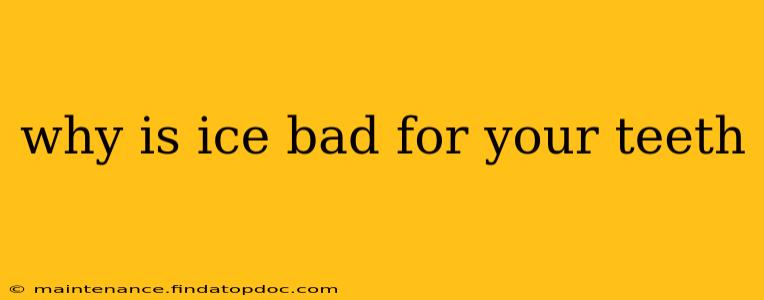Many of us enjoy a refreshing crunch of ice in our drinks, but this seemingly harmless habit can have serious consequences for your teeth. While the occasional ice cube won't likely cause immediate damage, regularly chewing on ice can lead to a range of dental problems. This article delves into the reasons why ice is detrimental to your oral health.
How Does Chewing Ice Damage Teeth?
The primary reason ice is bad for your teeth is its extreme hardness. Your teeth, while strong, are not designed to withstand the force of repeatedly biting down on something as hard as ice. This can lead to:
- Cracked or chipped teeth: The most immediate and visible damage. The force can cause tiny fractures in the enamel, the outer protective layer of your teeth. These cracks can eventually lead to more serious problems.
- Fractured fillings or crowns: If you have existing dental work, chewing ice can dislodge or crack these restorations, requiring costly repairs or replacements.
- Tooth sensitivity: Microscopic cracks in the enamel can expose the dentin, the underlying layer of your tooth, which contains nerve endings. This makes your teeth more sensitive to hot, cold, sweet, and sour foods and drinks.
- Worn enamel: Over time, the constant abrasion from chewing ice wears down the enamel, making your teeth more vulnerable to decay and other problems. This can lead to increased tooth sensitivity and a yellowish appearance.
What Are the Long-Term Effects of Chewing Ice?
The damage from chewing ice is cumulative. While a single instance might not cause significant harm, the repetitive nature of the habit can lead to significant long-term problems:
- Increased risk of cavities: Worn enamel is more susceptible to bacterial attack, leading to an increased risk of cavities.
- Increased risk of gum disease: Damage to the teeth can affect the surrounding gums, potentially increasing the risk of gum disease (gingivitis or periodontitis).
- Costly dental repairs: The need for fillings, crowns, root canals, or even tooth extractions due to ice-induced damage can be expensive.
Is it Okay to Occasionally Chew Ice?
The occasional ice cube is unlikely to cause significant harm. However, it's crucial to be mindful of your habit. If you find yourself constantly chewing ice, it's best to break the habit.
How Can I Stop Chewing Ice?
Breaking any habit takes time and effort. Here are some tips:
- Identify your triggers: What situations or emotions lead you to chew ice? Addressing the underlying causes can help you break the habit.
- Find alternatives: Satisfy your need for a cool sensation with ice-cold water, sugar-free popsicles, or frozen fruit.
- Be mindful: Pay attention to when you're chewing ice and consciously choose a healthier alternative.
- Seek professional help: If you're struggling to break the habit on your own, consider seeking help from a therapist or counselor.
What if I Already Have Damaged Teeth from Chewing Ice?
If you suspect you have damaged your teeth from chewing ice, it's crucial to see a dentist as soon as possible. They can assess the damage and recommend appropriate treatment, which may include fillings, crowns, or other restorative procedures.
Can I Strengthen My Teeth to Resist Ice Damage?
While you can't make your teeth impervious to damage from ice, maintaining good oral hygiene practices can help strengthen enamel and reduce the risk of further problems. This includes regular brushing and flossing, and regular dental checkups. A healthy diet rich in calcium and vitamin D is also beneficial for strong teeth.
This information is for general knowledge and does not constitute medical advice. Always consult a dentist for any concerns about your oral health.
